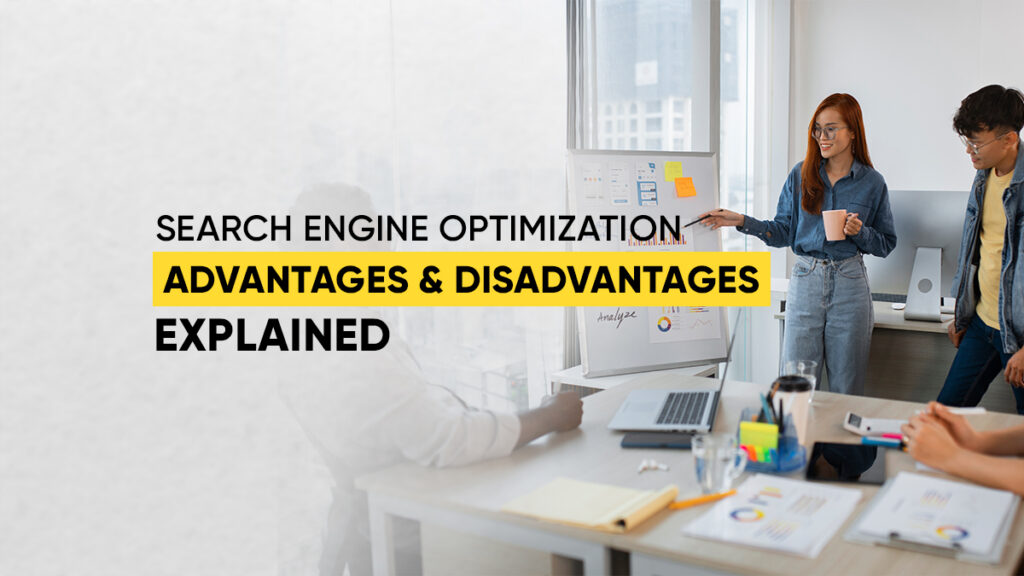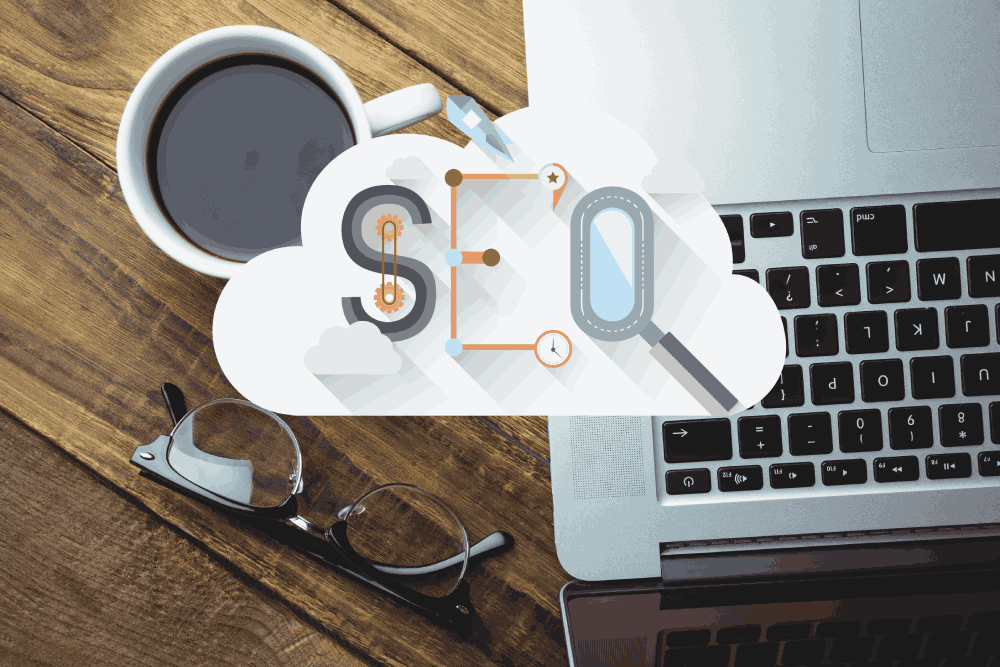
 Back
Back
Search engine optimization, or SEO, is one of the most popular terms in digital marketing. SEO is a process that helps to improve the overall quality of content on your website and assists in increasing traffic on your website. With an exponential increase in internet users with each passing day, digital marketing is the only way forward. SEO practices assist in generating high-quality content for your website, making way for genuine conversions. Good content, keywords, and other key SEO practices are perfect for top listings during internet searches. If you are a business owner, then it is really important to understand What is SEO and Search Engine Optimization Advantages and Disadvantages are before investing in SEO.
Internet search is an integral part of our lives-be; it is finding a restaurant, a TV repair shop, or a play school nearby. With more and more people relying on online buying, especially post-Covid, your business must be visible when people are searching for a particular thing. Visibility is crucial for product/service selling; your website would be clicked on more often with a better ranking in search results. The purpose of using SEO practices is to improve the visibility of your business online. While you can’t do without an effective SEO Strategy, you must know about search engine optimization’s advantages and disadvantages. Let us explore these advantages and disadvantages of SEO.

Amongst the many advantages of Search Engine Optimization, here are a few prominent ones.
Better Visibility/ Business Promotion
An effective SEO strategy works as a business promotion 365 days a year, 24*7. When your business appears among top listings in internet searches, there are more inquiries and more conversions. So, without having to pay for any customer acquisition, you get new leads and customers, and that is when your business is being promoted simultaneously.
Cost-Effective Techniques
Irrespective of your budget size, you may be able to design an effective SEO strategy for your business. If it doesn’t pinch your pocket, you may hire a fancy agency to design an SEO strategy for you, or else, with a few basic SEO techniques and quality content, you may be able to pull up an efficient SEO plan.
SEO also helps other marketing initiatives for a business. Through link-building, you may be able to drive more traffic from Facebook, Instagram, LinkedIn, etc.
Long-Term Benefits
An efficient SEO strategy will go a long way in building up your brand. With an SEO, you may monitor and analyze your website’s rankings, conversions, and overall traffic based on your requirement- daily/ weekly/ monthly, or annual basis.
An effective SEO strategy entails an excellent user experience for visitors to your website.
Must Read: Digital Marketing and Its Impact on Small Businesses
While all looks good with an effective SEO strategy, there are some downsides too. Here are a few disadvantages of SEO ( Search Engine Optimization):
Delayed Results
For an SEO strategy to work, you would need to give it some time. If you are looking for quick results, you may be disheartened. You would need to invest a good amount of time to see the outcome of your efforts.
Consistent Monitoring & Investment
You can measure the results of your SEO strategy whenever you want and for whatever period you want. This enables you to assess how well or badly your strategy is working. Sometimes it may not work at all, despite the best content.
Changes in Algorithm
When working to optimize SEO for Internet searches, you are dependent on an Algorithm that may change at any time. You have no control over Google algorithms; what you thought should work may not work at all.
More Investment to beat the competition
While basic SEO techniques will work for your business, however, to remain competitive, you might need some professional help to beat your competitors. In the dynamic marketing environment where algorithms change, you would need an edge to stay ahead in the race. The expertise may not be available in-house always, and paid assistance may be required too.

Having gone through Search Engine Optimization advantages and disadvantages, you may still need SEO to grow your business. SEO is a necessary evil. With online marketing being the way forward, there is no way that you may discount its importance. Keep track of the trending strategies that your rivals are following. In the coming years, Artificial Intelligence (AI) and Voice Search will impact rankings. With mobile being the most popular device for internet searches, mobile compatibility will be important in determining a business’s ranking.
An Effective SEO Strategy is the need of the hour. You must keep updating your SEO plans as per the prevailing keeping with trends, not only to keep at par with the competition but also to gain an edge. Monitor and analyze your performance and post relevant content.
Those were some prominent Search Engine Optimization advantages and disadvantages that you must take into account when designing your digital marketing strategy. And with growing dependence on online search for everything possible under the sun (finding a bakery/ nearest toy shop or a grocery store), you cannot but miss the bus. SEO allows for better ranking in organic searches and makes your website found easily. However, if designing an SEO strategy might seem too technical to you, you may seek professional help too. There are professional agencies that guide and design an effective SEO strategy for you. Digital Tokri is India’s fast-emerging Digital Marketing Company In Pune that assists you in creating the perfect website for your business with the right combination of SEO practices.
Considering the benefits that SEO brings to your business, it is certainly worth your time and money.
There are two things that will play a huge role in SEO in the future: voice search and mobile optimization. The rise of AI and machine learning means search engines will get even smarter, so user intent is more important than ever. With the boom in mobile searches like “Where’s the closest pizza place? ” it is highly likely that local SEO will continue to gain importance in the future as new technologies and user behaviors are adopted.
There are three main types of SEO:
1. On-Page SEO: This is the nitty-gritty stuff you do on your website – optimizing content meta tags and ensuring a smooth user experience.
2. Off-Page SEO: Here, it’s all about building your website’s credibility through external means, like quality backlinks, social media signals, and influencer collaborations.
3. Technical SEO: The backstage magician ensures your website’s infrastructure is top-notch for search engines to navigate easily. This involves site speed, mobile-friendliness, and a bunch of other tech stuff.
Video SEO is one of the unsung heroes of video content. Having a blockbuster movie and nobody knowing about it is what YouTube SEO helps you avoid. As a result, your video shows up in searches and recommendations, meaning more views, subscribers, and maybe even stardom. It’s also not just about being seen; it’s about being seen by the right people. By optimizing YouTube, you can reach people who want your content and turn casual viewers into loyal followers.
SEO and ads are like two peas in a pod, and the “better” one depends on your goals. SEO is the tortoise in this race – slow and steady but with long-lasting results. It’s all about building a solid foundation. On the other hand, ads are the hare – quick and immediate, but the effects dwindle once the budget tap is turned off. Ideally, a combo of both is the sweet spot. SEO for the marathon, ads for the sprint – ensuring your brand is both omnipresent and evergreen.
© Digital Tokri (Ira Digital Services). All rights reserved.